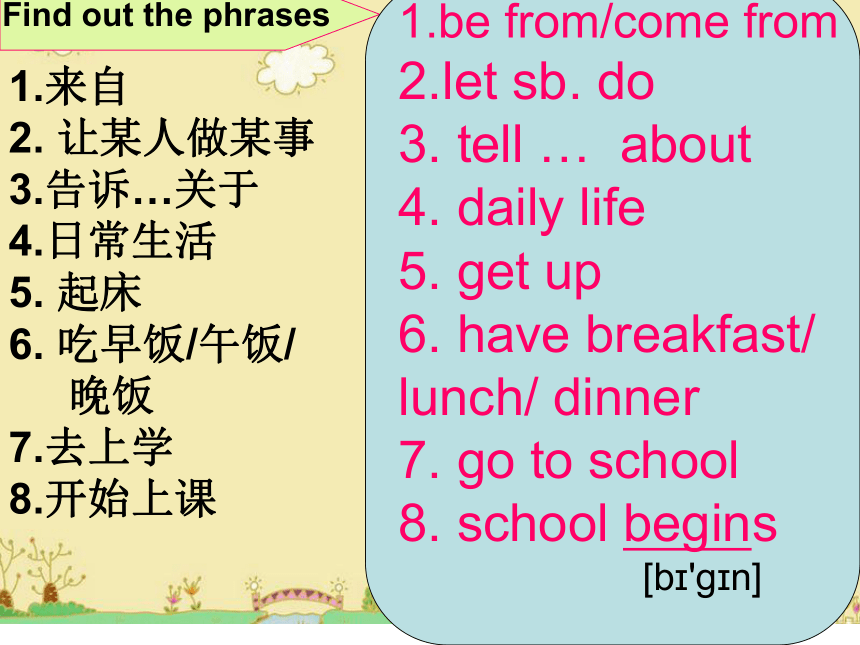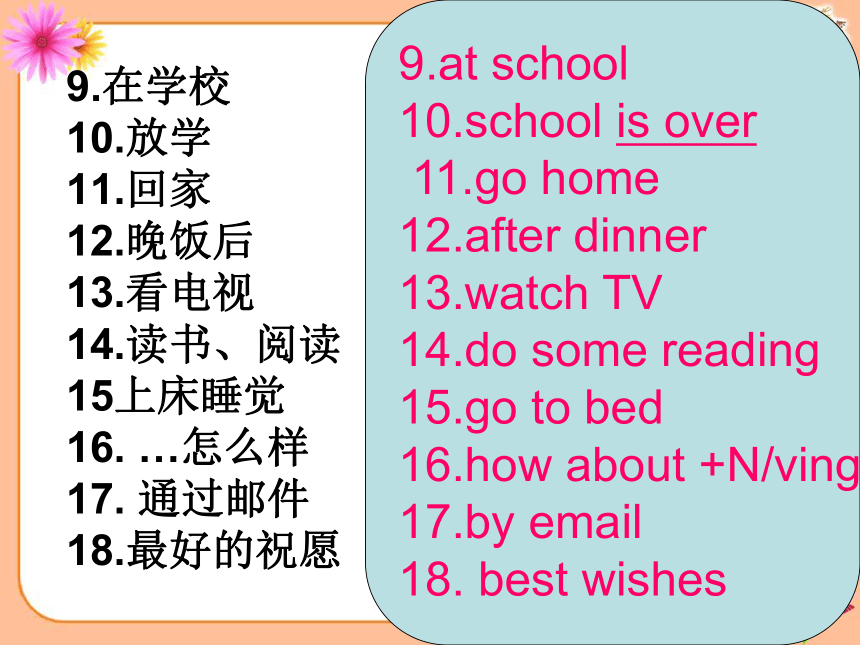Unit 1 I go to school at 8:00 Lesson 2 课件
文档属性
| 名称 | Unit 1 I go to school at 8:00 Lesson 2 课件 |  | |
| 格式 | zip | ||
| 文件大小 | 643.1KB | ||
| 资源类型 | 教案 | ||
| 版本资源 | 人教精通版(三年级起点) | ||
| 科目 | 英语 | ||
| 更新时间 | 2016-11-05 19:52:29 | ||
图片预览





文档简介
课件10张PPT。 lesson2Unit 1 I go to school at 8:00lunch [l?nt?]?
午餐breakfast ['brekf?st]?早餐dinner ['d?n?]晚餐1.来自
2. 让某人做某事
3.告诉…关于
4.日常生活
5. 起床
6. 吃早饭/午饭/
晚饭
7.去上学
8.开始上课
Find out the phrases
1.be from/come from
2.let sb. do
3. tell … about
4. daily life
5. get up
6. have breakfast/
lunch/ dinner
7. go to school
8. school begins
[b?'g?n]
9.在学校
10.放学
11.回家
12.晚饭后
13.看电视
14.读书、阅读
15上床睡觉
16. …怎么样
17. 通过邮件
18.最好的祝愿
9.at school
10.school is over
11.go home
12.after dinner
13.watch TV
14.do some reading
15.go to bed
16.how about +N/ving
by email
best wishes
Talk about the following questions1.When do you get up every morning?
2.When do you go to school?
3.How do you go to school?
4.How many classes do you have a day?Timetable7:00 AM get up
7:30AM have breakfast
8:00AM go to school
9:00AM School begins
12:00 noon have lunch
3:30PM school is over
4:00PM go home
6:00 PM have dinner
8:30PM watch TV
9:00PM go to beddaily
lifeI have breakfast at 7:30 in the morning.
I don’t have breakfast at 7:30 in the morning.、句型转换肯定句 变否定句:
有be动词的在其后加not,其余一般现在时在动词前加don't(第三人称单数用doesn't),如果句中有some一般还要改成any
肯定句变一般疑问句:
1 如果谓语动词是be动词,则把be动词提到主语前面,再加上问号就行。
2 如果谓语动词是实义动词,则在主语前面加助动词do或does,动词为原形。Let’s do a survey (Pair work)A: When (What time) you get up every morning?
B:I get up at …
A:Do you have breakfast at …?
B:No, I don’t. I have breakfast at …
……
B:what about you? When do you have lunch?
A:I have lunch at 12:00
Homework① dictate the new words and phrases.
② finish lesson 2
午餐breakfast ['brekf?st]?早餐dinner ['d?n?]晚餐1.来自
2. 让某人做某事
3.告诉…关于
4.日常生活
5. 起床
6. 吃早饭/午饭/
晚饭
7.去上学
8.开始上课
Find out the phrases
1.be from/come from
2.let sb. do
3. tell … about
4. daily life
5. get up
6. have breakfast/
lunch/ dinner
7. go to school
8. school begins
[b?'g?n]
9.在学校
10.放学
11.回家
12.晚饭后
13.看电视
14.读书、阅读
15上床睡觉
16. …怎么样
17. 通过邮件
18.最好的祝愿
9.at school
10.school is over
11.go home
12.after dinner
13.watch TV
14.do some reading
15.go to bed
16.how about +N/ving
by email
best wishes
Talk about the following questions1.When do you get up every morning?
2.When do you go to school?
3.How do you go to school?
4.How many classes do you have a day?Timetable7:00 AM get up
7:30AM have breakfast
8:00AM go to school
9:00AM School begins
12:00 noon have lunch
3:30PM school is over
4:00PM go home
6:00 PM have dinner
8:30PM watch TV
9:00PM go to beddaily
lifeI have breakfast at 7:30 in the morning.
I don’t have breakfast at 7:30 in the morning.、句型转换肯定句 变否定句:
有be动词的在其后加not,其余一般现在时在动词前加don't(第三人称单数用doesn't),如果句中有some一般还要改成any
肯定句变一般疑问句:
1 如果谓语动词是be动词,则把be动词提到主语前面,再加上问号就行。
2 如果谓语动词是实义动词,则在主语前面加助动词do或does,动词为原形。Let’s do a survey (Pair work)A: When (What time) you get up every morning?
B:I get up at …
A:Do you have breakfast at …?
B:No, I don’t. I have breakfast at …
……
B:what about you? When do you have lunch?
A:I have lunch at 12:00
Homework① dictate the new words and phrases.
② finish lesson 2
同课章节目录
- Unit 1 I go to school at 8:00.
- Lesson 1
- Lesson 2
- Lesson 3
- Lesson 4
- Lesson 5
- Lesson 6
- Unit 2 What's your hobby?
- Lesson 7
- Lesson 8
- Lesson 9
- Lesson 10
- Lesson 11
- Lesson 12
- Unit 3 Would you like to come to my birthday party
- Lesson 13
- Lesson 14
- Lesson 15
- Lesson 16
- Lesson 17
- Lesson 18
- Fun Time 1
- Recycle 1
- Recycle 2
- Fun Reading
- Unit 4 January is the first month.
- Lesson 19
- Lesson 20
- Lesson 21
- Lesson 22
- Lesson 23
- Lesson 24
- Unit 5 July is the seventh month.
- Lesson 25
- Lesson 26
- Lesson 27
- Lesson 28
- Lesson 29
- Lesson 30
- Unit 6 There are four seasons in a year.
- Lesson 31
- Lesson 32
- Lesson 33
- Lesson 34
- Lesson 35
- Lesson 36
- Fun Time 2
- Recycle 1
- Recycle 2
- Fun Reading
